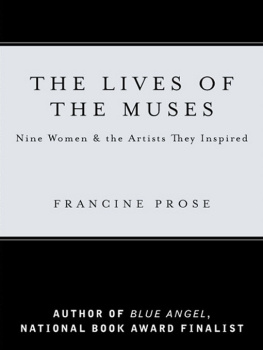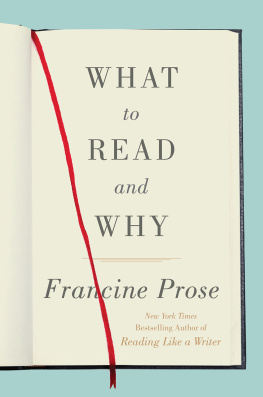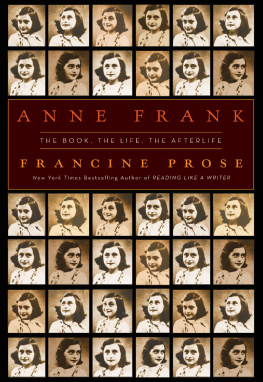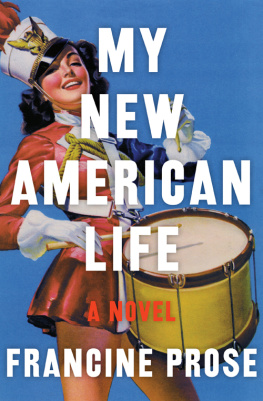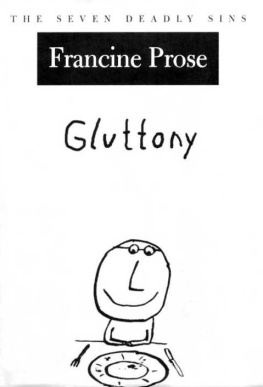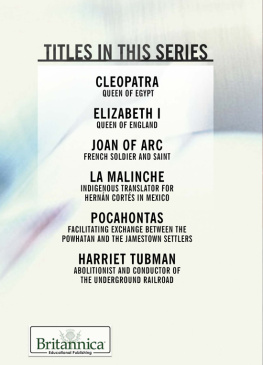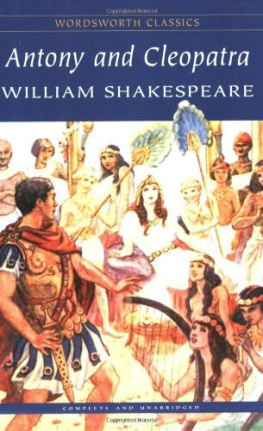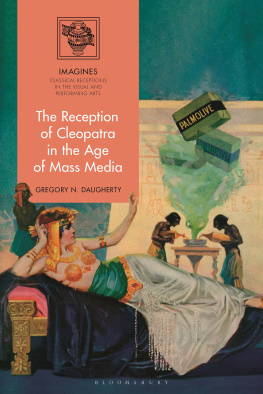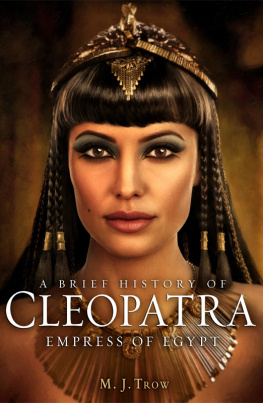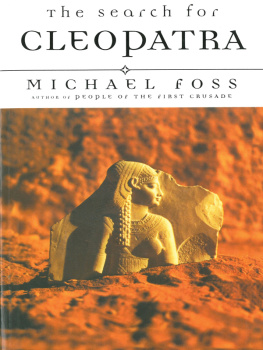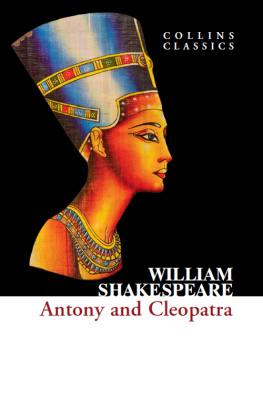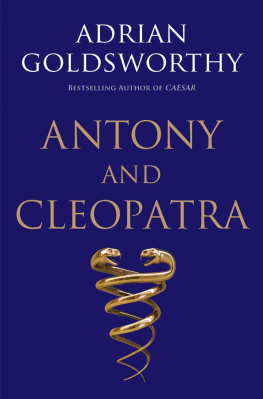Cleopatra

Cleopatra
Her History, Her Myth
Francine Prose
ANCIENT LIVES

Copyright 2022 by Francine Prose.
All rights reserved.
This book may not be reproduced, in whole or in part, including illustrations, in any form (beyond that copying permitted by Sections 107 and 108 of the U.S. Copyright Law and except by reviewers for the public press), without written permission from the publishers.
Yale University Press books may be purchased in quantity for educational, business, or promotional use. For information, please e-mail (U.K. office).
THE AGE OF CAESAR: FIVE ROMAN LIVES by Plutarch, edited by James Romm, translated by Pamela Mensch. Copyright 2017 by Pamela Mensch and James Romm. Introduction copyright 2017 by Mary Beard. Used by permission of W. W. Norton & Company, Inc.
Frontispiece: Beehive Mapping.
Set in the Yale typeface designed by Matthew Carter, and Louize, designed by Matthieu Cortat, by Integrated Publishing Solutions, Grand Rapids, Michigan.
Library of Congress Control Number: 2022931893
ISBN 978-0-300-25667-3 (hardcover : alk. paper)
A catalogue record for this book is available from the British Library.
ANCIENT LIVES
Ancient Lives unfolds the stories of thinkers, writers, kings, queens, conquerors, and politicians from all parts of the ancient world. Readers will come to know these figures in fully human dimensions, complete with foibles and flaws, and will see that the issues they facedpolitical conflicts, constraints based in gender or race, tensions between the private and public selfhave changed very little over the course of millennia.
James Romm
Series Editor
The biographer must be a historian, but also a novelist and a snoop.
Diane Johnson, Lesser Lives
The past is always an idea which people have about it after an event. Those whose job it is to tell the story of the past in their own present call it history. To generations born later, receiving the recollections of their parents or grandparents, or reading the historians, the past is a story, a myth handily packaged into an era, bounded by a particular eventa war, a financial crisis, a reign, a decade, a centuryanything that conveniently breaks the ongoing tick of time into a manageable narrative.
Jenny Diski, The Sixties
Contents
Cleopatra
Introduction
Two-thirds of the way through Plutarchs Life of Antony is a passage that may remind us of the ways in which close reading can broaden and deepen our understanding.
Writing more than a century after the deaths of Antony and Cleopatra, Plutarch is describing a moment when the bonds between the lovers were beginning to fray. During a long hiatus from his liaison with the Egyptian queen, Antony has married Octavia, the widowed half-sister of Octavian. Brokered by Octavian, the marriage has eased the growing tensions between the rival Roman leaders. Antony and the exemplary Octavia have been living happily in Rome, raising her two children, Antonys two sons from an earlier marriage, and two daughters whom Antony and Octavia have together. But when he sets off to fight the Parthians in Syria, Antony again longs for Cleopatra. According to Plutarch, the reawakening of that desirethe terrible mischief that has been slumberingis the root cause of the catastrophic Parthian campaign in which tens of thousands of Antonys soldiers died of disease and starvation or were slaughtered in battle.
In the wake of this humiliating disaster, Antony fights his way through Armenia to the Mediterranean coast, where he summons Cleopatra to join him. She agrees but fears that Octavia is also headed there from Greece. Both women are bringing massive quantities of supplies for Antonys army. This is when the revelatory passage occurs: an account of Cleopatras actions when for the first time she worries that she will be forced to deal with a romantic rival.
Cleopatra, sensing that Octavia was coming to challenge her at close quarters, feared that if her rival added to the nobility of her character and the power of Caesar the pleasure of her companionship and her devotion to Antony, she would become irresistible and acquire complete mastery over her husband. So she pretended to be madly in love with Antony herself, and made herself slender by a light diet. Her glance, when he entered the room, was rapturous, and when he left, seemed downcast and despondent. She took care to be often seen weeping, and then would quickly wipe the tears away and try to conceal them, as if she wished him to be unaware of them.
The attentive reader will be struck by the fact that Cleopatras anxious jealousy of Octavia has become an integral part of her story, an element that will figure in subsequent dramatizations of her life, from Shakespeares Antony and Cleopatra to the bloated 1963 epic starring Elizabeth Taylor. What makes this fact so problematic is the tone and the substance of Plutarchs account, whichagain upon close readingwill probably make us wonder, How could Plutarch have known that Cleopatra was faking her passion for Antony?
The Egyptian queen was an intelligent and diplomatic woman, who certainly would have realized that it would have been unwise to confide, even in her handmaids, the fact that she was playacting. Either Plutarch invented his interpretation of the queens show of anguish or he was drawing on one of the primary sources that have been lost to us. What is inarguable is that either he or his source was hostile enough to Cleopatra to suspect her of fraudulence and to reject the possibility that her emotions might have been real.
I cite this passage early on in this book for the clarity and the efficiency with which it telegraphs a theme that will recur throughout: what it has meant for our understanding of Cleopatra to have had her storyher historyso often told by writers who had a political agenda, by authors who distrusted her motives, by chroniclers who were suspicious of her public and private behavior, and by historians who, to put it bluntly, believed that she was a liar.
It would be too easy to suggest that this degraded view of Cleopatra was limited to the men who told her story. The few women who took her history on were until relatively recently no less unfriendly.
In her Lives of Cleopatra and Octavia, written in 1757, for example, Sarah Fielding, sister of the more famous author of Tom Jones, writes what purports to be Cleopatras first-person account. Cleopatra confesses to having pretended to be frightened (and in need of male protection) after she trips and stumbles upon meeting Antony at Tarsus. Her falseness is hardly surprising when, as Fielding has Cleopatra tell us, she looked upon the rest of Mankind with the utmost Contempt; I considered them as no more capable of Feeling, then if they were inanimate.The Pleasures or Pains of others were to me of so little Importance, that I lived as if I had been the only Creature on Earth who had any Sensation.
Any attempt to write the life of Cleopatra requires us to tease out what happened, or what is most likely to have happened, from the vision of duplicity, reckless decadence, and sluttish immorality that for a variety of reasons her contemporaries and successors have chosen to portray.
The myth that has come to surround Cleopatra has been woven over the armature of the dates and facts that can be proven. We know that she was the last ruler who belonged to the Ptolemaic dynasty, established in the wake of Alexander the Greats conquest of Egypt. We know who her father was and the names of her siblings, though there is some disagreement about how many she had. We know that three and quite likely four of her siblings died violent deaths. We know that she was highly educated and multilingual. We knowor at least we are reasonably certainthat she grew up in the vast complex of the royal palace at Alexandria.
Next page


